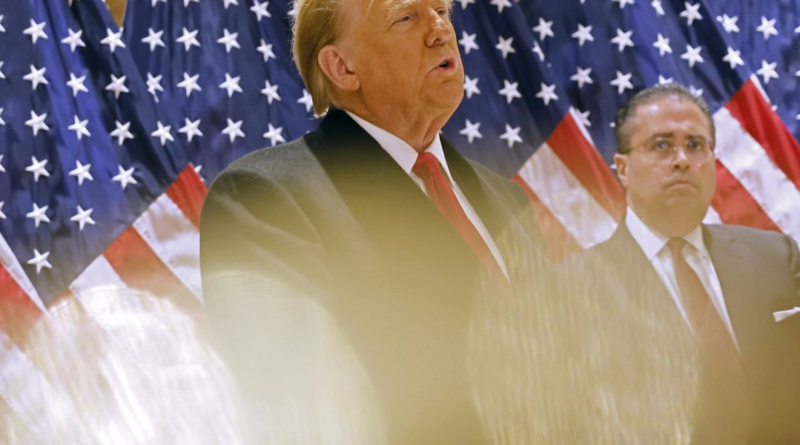Trump Social's public debut puts ‘all other meme stocks to shame,’ veteran analyst says
Donald Trump’s media company, Trump Media & Technology Group, went public this week. The parent company of Trump’s social media platform, Truth Social, trades under the ticker symbol DJT (also the former president’s initials); Wall Street gives it a market valuation of nearly $8 billion. As of Wednesday, the stock traded at roughly $66 per share.
It’s the first time in almost 30 years that one of Trump’s business enterprises has gone public—and Bloomberg estimates it boosted Trump’s net value by $4 billion. Surprisingly enough, this also sends him into the ranks of the Bloomberg Billionaires Index for the first time. Observers have also questioned whether Trump will use this extra wealth to cover a $175 million bond he owes on a civil court judgment, but analysts aren’t optimistic about DJT’s future.
Analysts warn DJT’s performance won’t match its clout by a long shot. Indeed, Michael Pachter, a managing director of equity research at wealth management firm Wedbush, called DJT a meme stock that “puts all other meme stocks to shame.”
Pachter, who’s been providing entertainment coverage for the past 20 years, says there are several red flags about the company, including its high valuation in relation to its low revenue, lack of earnings, and limited appeal to users, that suggest the stock will be a flop.
Why DJT could be the next meme stock
DJT’s public launch has been a long time coming. A successful but rocky merger between Trump Media & Technology Group, the parent company of Truth Social, and Digital World Acquisition Corp., a blank-check company, finally brought many years of civil and criminal lawsuits, closing extensions, and vote postponements to an end. Although DJT was able to finally get off the ground, Pachter doesn’t have high hopes for the stock’s future performance, predicting it’s doomed like other meme stocks including GameStop and Bed Bath & Beyond.
Pachter defines a meme stock as one “where the valuation is completely dissociated from its underlying fundamentals,” and whose popularity is driven by “a herd of retail investors who share their views on message boards, rather than by a group of thoughtful and rational institutional investors.”
Other meme stocks, such as GameStop, soared during the pandemic-era retail investor bump because investors piled in “regardless of fundamentals in order to capitalize on the mismatch of expectations,” Pachter says. GameStop’s stock, which closed at over $340 per share at its pandemic-era peak in January 2021 since crashed, GameStop stocks closed at just $50 the following month.
Sell ratings, market caps, and valuations of other meme stocks demonstrate how unstable Trump’s media company is, Pachter says. Wedbush has a sell rating on GameStop and a $5.60 price target, he said. Its stock is trading at $13; its market cap is around $4 billion, and it has sales of around $5 billion, “so the valuation isn’t that outrageous.”
Trump Social, on the other hand, has a valuation between $6 billion and $7 billion, but only brings in revenues of around $5 million. “It trades at over 1,000 times [its] revenue, where GameStop trades at less than one times its revenue,” Pachter notes.
The truth about Truth Social
When DJT went public this week, so did its social media platform Truth Social. While the high trading price might make investors think the platform is successful, it brought in only $3.4 million in revenue for the first nine months of 2023 and lost around $49 million, according to Axios.
For context, Trump is the only president to ever create a social media platform, which he launched in 2022 after being banned from major social platforms including Facebook and X in the aftermath of the Jan. 6. attack on the U.S Capitol. His actions of using the platform to organize an armed insurrection to storm the Capitol building as Congress was certifying the results of the 2020 election, “constituted a severe violation” of Meta’s rules, according to the social media company. His accounts on both platforms have since been reinstated. While Trump made history by making his own social media platform, so far, it hasn’t taken off like other popular apps.
Not only is Truth Social struggling to make money, but it’s also struggling to gain users.
The social media platform has fewer users and less income than any social network that has gone public before–and its user base, mostly MAGA supporters, doesn’t appeal to everyone. Indeed, according to a 2022 Pew Research Center study that examined 200 prominent accounts on the platform, about half the Truth Social accounts had references to being right-leaning or pro-Trump in their profile–higher than any other alternative social media site.
Truth Social’s user turnout is underperforming several other social media platforms. Truth Social doesn’t release official user numbers, which is unusual for a public company. But according to estimates, there are about 5 million monthly visits to the site. By comparison, X (formerly Twitter) has about 550 million monthly users while Snapchat has about 800 million monthly users.
While none of them are “particularly profitable,” Pachter says, “at least they have a user base that can justify” high stock prices and big investor interest. To justify its high valuation, he thinks Truth Social would need at least 200 million users. Since its current user base heavily overlaps with Trump supporters, the platform will have trouble gaining a larger following.
“Truth Social has not attracted users outside of MAGA world,” Pachter says. Other social media platforms, like Snapchat, are “appealing to virtually anyone under 30, so it has a potential audience of 2 to 3 billion.” The maximum addressable market for Truth Social, he estimates, is just about “75 million people who like Trump.”



